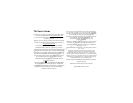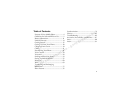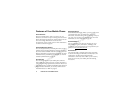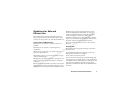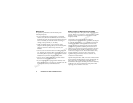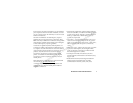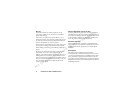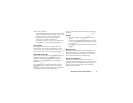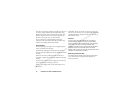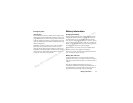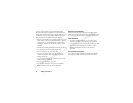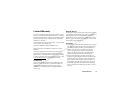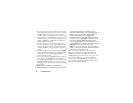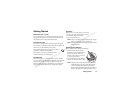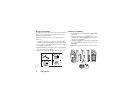N
o
t
f
o
r
c
o
m
m
e
r
c
i
a
l
u
s
e
–
S
o
n
y
E
r
i
c
s
s
o
n
I
n
c
.
Guidelines for Safe and Efficient Use 9
Persons with pacemakers:
• Should ALWAYS keep the phone more than six inches
from their pacemaker when the phone is turned ON;
• Should not carry the phone in a breast pocket;
• Should use the ear opposite the pacemaker to
minimize the potential for interference.
• If you have any reason to suspect that interference is
taking place, turn your phone OFF immediately.
Hearing Aids
Some digital wireless phones may interfere with some
hearing aids. In the event of such interference, you may
want to consult your service provider or call your local
Sony Ericsson Contact Center to discuss alternatives.
Other Medical Devices
If you use any other personal medical device, consult the
manufacturer of your device to determine if they are
adequately shielded from external RF energy. Your
physician may be able to assist you in obtaining this
information.
Turn your phone OFF in health care facilities when any
regulations posted in these areas instruct you to do so.
Hospitals or health care facilities may be using equipment
that could be sensitive to external RF energy.
Turn your phone OFF in any facility where posted notices
so require.
Aircraft
• Turn off your mobile phone before boarding any
aircraft.
• To prevent interference with communication systems,
you must not use your mobile phone while the plane
is in the air.
• Do not use it on the ground without permission from
the crew.
Blasting Areas
Turn off your mobile phone when in a blasting area or in
areas posted “turn off two-way radio” to avoid interfering
with blasting operations. Construction crews often use
remote control RF devices to set off explosives.
Explosive Atmosphere
Turn off your mobile phone when in any area with a
potentially explosive atmosphere. It is rare, but your mobile
phone or its accessories could generate sparks. Sparks in
such areas could cause an explosion or fire resulting in
bodily injury or even death.



